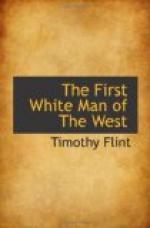[Illustration]
CHAPTER V.
Boone is pursued by the Indians, and eludes their pursuit—He encounters and kills a bear—The return of his brother with ammunition—They explore the country—Boone kills a panther on the back of a buffalo—They return to North Carolina.
Boone’s brother had departed on the first of May. During the period of his absence, which lasted until the twenty-second of July, he considered himself the only white person west of the mountains. It is true, some time in this year, (1770,) probably in the latter part of it, an exploring party led by General James Knox, crossed the Alleghany mountains. But this exploring expedition confined its discoveries principally to the country south and west of the river Kentucky. This exploration was desultory, and without much result. Boone never met with them, or knew that they were in the country. Consequently, in regard to his own estimation, he was as completely alone in this unexplored world, as though they had not been there.
He never allowed himself to neglect his caution in respect to the numerous savages spread over the country. He knew that he was exposed every moment to the danger of falling into their hands. The fate of Stewart had served as a warning to him. It is wonderful that he should have been able to traverse such an extent of country as he did, and live in it so many months, and yet evade them. It required no little ingenuity and self-possession to take such measures as insured this good fortune.
About mid-day, near the close of the month of June, he paused in one of his excursions for a short time under the shade of a tree. As he looked cautiously around him, he perceived four Indians advancing openly towards him, but at a considerable distance, and apparently without having yet seen him. He did not delay to recommence his course through the woods, hoping by short turns, and concealing himself among the hills, to prevent an encounter with them, as the chance of four to one was too great an odds against him. He advanced in this way one or two miles; but as he cast a glance behind, he saw, with pain, that they sedulously followed in his trail at nearly their first distance, showing the same perseverance and sagacity of pursuit with which a hound follows a deer. When he first perceived them, he was in such a position that he could see them, and yet remain himself unseen. He was convinced that they had not discovered his person, although so closely pursued by them. But how to throw them off his trail, he was at a loss to conjecture. He adopted a number of expedients in succession, but saw the Indians still on the track behind. Suddenly a method occurred to his imagination, which finally proved successful. Large grape vines swung from the trees in all directions around him.
Hastening onward at a more rapid pace, until he passed a hill that would serve to conceal him for a few moments, he seized a vine sufficiently strong to support his weight; and disengaging it from the roots, climbed it a few feet, by bracing against the tree to which it was attached. When he had attained the necessary height, he gave himself so strong an impulse from the tree, that he reached the ground some yards from the spot where he left it. By this expedient he broke his trail.




